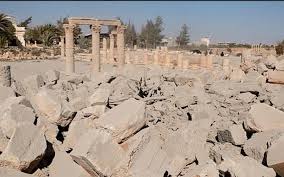Satellite images confirm the destruction of another famed temple in Syria’s Palmyra, the United Nations said late Monday.
Satellite images confirm the destruction of another famed temple in Syria's Palmyra, the United Nations said late Monday.
"We can confirm destruction of the main building of the Temple of Bel as well as a row of columns in its immediate vicinity," the UN training and research agency UNITAR said, providing satellite images from before and after a powerful blast in the ruins of the ancient city Sunday.
The blast had already raised fears Monday that the Takfiri group, ISIL (Islamic State in Iraq and Levant), had damaged another of the Middle East's most treasured heritage sites.
UNITAR said its satellite program put to rest any doubts that the 2,000-year-old Temple of Bel had been destroyed in the blast.
 A shot taken on August 27 clearly shows an erect, rectangular structure surrounded by columns, while a shot taken on Monday showed there was little left besides a few columns in the very outer edges of the site.
A shot taken on August 27 clearly shows an erect, rectangular structure surrounded by columns, while a shot taken on Monday showed there was little left besides a few columns in the very outer edges of the site.
ISIL already destroyed the smaller Baal Shamin temple at Palmyra last week, confirming the worst fears about their intentions for the site, which they seized from Syrian regime forces in May.
UNITAR on Friday also presented satellite images confirming the destruction of the Baal Shamin temple, which the UN's cultural agency UNESCO called a "war crime".
The Takfiris have carried out a sustained campaign of destruction against heritage sites in areas under their control in Syria and Iraq, and in mid-August beheaded the 82-year-old former antiquities chief in Palmyra.
Known as the "Pearl of the Desert", Palmyra, which means City of Palms, lies 210 kilometers (130 miles) northeast of Damascus.
Before the Syrian conflict erupted 2011, more than 150,000 tourists visited Palmyra every year.
Before the arrival of Christianity in the second century, Palmyra worshipped the Semitic god Bel, along with the sun god Yarhibol and lunar god Aglibol.
Syria's antiquities chief Maamoun Abdulkarim described the Temple of Bel as Palmyra's most important site, and also the most important temple in the Middle East along side Baalbek in Lebanon.
Construction of the temple began in 32 BC and ended in the second century, and it later served as both a church and a mosque.